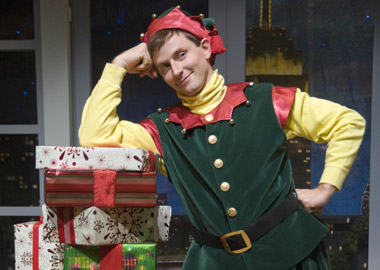What do David Sedaris, Hedda Gabler and Mikhail Bulgakov have in common? Not a lot, I’ll admit. But in this week’s docket of performances I found a common thread in the situations faced by Sedaris, the sardonic diarist of life as a Macy’s elf; Hedda, the eponymous heroine of Henrik Ibsen’s drama; and Bulgakov, the Soviet-era novelist. All find themselves in grotesquely oppressive circumstances, and respond in surprising ways.
The Santaland Diaries is the monologue that made David Sedaris a household name, at least in NPR-member households. The stage version of his account of working as one of Santa’s elves during the Christmas rush is now in its second seasonal run at Shakespeare & Company (shakespeare.org, 413-637-3353). Director Tony Simotes’ notion is to mount the one-man show annually with a different company actor each year. He’s set it in a high-rise Manhattan apartment where a gay man (in Ryan Winkles’ performance, very gay) regales his party guests—us, the audience—with hilariously horrible backstage stories of his Worst Job Ever.
Against the job’s enforced chirpiness and the daily onslaught of screaming kids and harassed parents (or, more often, the other way around), this elf’s defense is satirical sabotage—like crooning a carol in the seductive style of Billie Holliday. Where Sedaris’ own rendition is deadpan, Winkles’ is, well, elfin. There’s an implied wink in almost everything he does, from wicked impersonations of both colleagues and the public, to quick-witted ad libs with his audience.
Hedda Gabler’s predicament is more than a little of her own making. She has married for stability, but still nurses the ember of an old flame. When financial constraints shatter her expectation of a glittering lifestyle, she turns vindictive, and when the old flame reappears, now out of reach, she engineers his destruction and then her own. Hedda is one of world drama’s most baffling and maddening anti-heroines. Vain, selfish, spiteful and ruthless, she’s also an example of one of Ibsen’s recurring concerns: the powerlessness of women in 19th-century Europe.
Daniel Elihu Kramer’s production of the 1891 tragedy, playing through this weekend at Smith College (smith.edu/smitharts, 413-585-2787), is assured and visually striking. The mostly student cast handles the highly charged material with subtlety and style. In the title role, Smith senior Emily Anne Wiest radiates an icy calm that is at once wounded and malevolent.
Mikhail Bulgakov was a writer of great imagination and daring, an artist whose work was routinely banned by the Soviet state and whose masterpiece, The Master and Margarita, described a Moscow inhabited by the devil. In Collaborators, Satan comes to the author in the form of Josef Stalin, offering him a measure of rehabilitation in return for writing a fawning biography of the dictator. The cat-and-mouse game that ensues, a what-if scenario based on fact, pits the writer’s wits—and wit—against the strongman’s absolute power.
John Hodge’s play is the latest in the National Theatre Live series of big-screen digicasts from the London stage to international movie houses. It debuted at the Amherst Cinema last week, with two reprise showings this Sunday and next month (amherstcinema.org, 413-253-2547). Described by the British press as “gripping, disturbing and often blackly comic,” the production incorporates aspects of Bulgakov’s magic realism. It stars two pillars of the British stage, the deceptively mild-mannered Alex Jennings as Bulgakov and the protean Simon Russell Beale as Stalin.



